Cambridge & Peterborough Mental Health Trust Pioneers Virtual Ward for Schizophrenia Patient

In a groundbreaking move to enhance patient care and reduce hospital stays, the Cambridgeshire and Peterborough NHS Foundation Trust has successfully treated a patient with schizophrenia using a pioneering ‘virtual ward’ model. This innovative approach allows patients to receive intensive monitoring and support in the comfort of their own homes, while still benefiting from the expertise of hospital-based clinicians.
The patient, being treated for schizophrenia, was prescribed clozapine, a medication requiring careful monitoring due to potential side effects. Traditionally, this would necessitate inpatient hospital care. However, the virtual ward system enabled clinicians to closely track the patient's progress and well-being remotely, significantly minimizing the need for prolonged hospitalisation.
How Does a Virtual Ward Work?
The virtual ward operates by utilising a combination of technology and dedicated clinical teams. Clinicians based within the hospital regularly monitor the patient’s vital signs, symptoms, and overall condition through various means, including:
- Remote Monitoring Devices: Patients may be equipped with wearable devices that track physiological data like heart rate, sleep patterns, and activity levels.
- Frequent Video Consultations: Regular video calls with nurses and psychiatrists allow for visual assessment and detailed discussions about the patient's condition and any concerns.
- Digital Communication Platforms: Secure messaging apps facilitate quick and easy communication between the patient, their family (with consent), and the clinical team.
- Home Visits: When necessary, community nurses or mental health professionals conduct in-person visits to provide direct support and assess the patient's environment.
Benefits of Virtual Wards
The adoption of virtual wards offers numerous advantages for both patients and the healthcare system:
- Improved Patient Wellbeing: Being at home can reduce anxiety and promote a sense of normality, contributing to a more positive recovery experience.
- Reduced Hospital Admissions: By providing intensive support in the community, virtual wards can prevent unnecessary hospital admissions and readmissions.
- Increased Capacity: Virtual wards free up valuable hospital beds, allowing them to be used for patients with more acute needs.
- Cost-Effectiveness: Treating patients in the community is generally more cost-effective than inpatient care.
- Enhanced Patient Choice: Virtual wards offer patients greater control over their treatment and recovery journey.
Looking Ahead
The success of this initial case highlights the potential of virtual wards to transform mental health care. The Cambridgeshire and Peterborough NHS Foundation Trust is exploring expanding this model to support more patients with complex mental health needs, demonstrating a commitment to innovative and patient-centered approaches. This development aligns with the broader NHS focus on providing care closer to home and improving access to mental health services. Further research will be crucial to fully understand the long-term impact of virtual wards and to refine best practices for their implementation.
The Trust emphasized that patient safety remains paramount, and rigorous protocols are in place to ensure the well-being of individuals participating in virtual ward programs.






